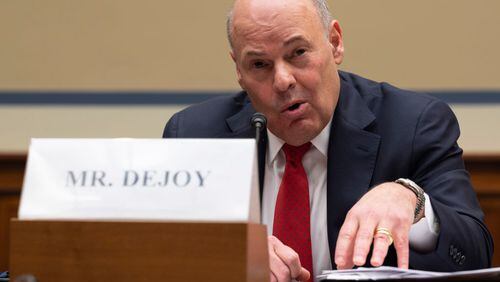The chairman of the board that serves as a watchdog over the state's judges resigned Tuesday, writing that the work of the Judicial Qualifications Commission is threatened by political and other outside forces that are interested only in protecting jurists connected to the right people.
In a letter to the Board of Governors for the State Bar of Georgia, Cartersville attorney Lester Tate said he was resigning as chairman and as a member of the Judicial Qualifications Commission because of a series of attacks on the JQC and its authority to investigate judges.
Just a few weeks ago, the Legislature approved a proposed constitutional amendment, which the voters will consider in the fall, to abolish and then recreate the commission.
“For some time now, certain individuals and groups within the judicial and other branches of government have sought to interfere with the commission’s work in ways that intrude upon its independence and hamper its day-to-day operations,” Tate wrote in his resignation letter to the State Bar, which appointed him to the JQC.
“Routine disciplinary actions, based on solid precedent and designed to punish egregious conduct, have sparked intrusion from the legislative branch, merely because the disciplined judge or judges had powerful friends,” Tate wrote. “Even efforts by the commission to bring under control a part-time independent contractor resulted in executive branch machinations that made those efforts fruitless.”
The electorate will be asked this fall to vote on a proposed amendment to the Georgia Constitution to abolish and remake the seven-member JQC, created 40 years ago to investigate complaints against judges. The proposed change would take away the influence the State Bar of Georgia has over the JQC and in exchange give the Legislature power over the commission.
Since 2007, JQC investigations have forced more than five dozen judges from the bench, including one of the legislators behind the push to make the change, Rep. Johnnie Caldwell, R-Thomaston.
Caldwell was a judge in the Griffin Circuit, which comprises Pike, Upson, Spalding and Fayette counties. Caldwell left the bench in 2010 after facing accusations he made rude, sexually suggestive comments to a female attorney. He won a seat in the state House two years later.
Last year, the JQC was criticized for its role in a criminal case brought against former DeKalb Superior Court Judge Cynthia Becker, who was indicted on charges she lied when JQC officials asked why she didn't grant bond to former DeKalb County School Superintendent Crawford Lewis after she sentenced him to jail.
Four days later, Becker signed an agreement not to pursue another judgeship and acknowledged in writing that she had unintentionally made erroneous statements. Then the charges were dropped.
“The power of the commission to carry out its appointed work has been compromised in a way that renders it totally ineffective,” Tate wrote. “Any disciplinary action which the commission now undertakes will simply be met with delay in the hopes that political considerations, rather than the facts and the law, will govern the outcome. I cannot in good conscience continue to participate in a charade that offers the promise of judicial integrity when, in truth, the actions of others have rendered the fulfillment of that promise an impossibility.”






